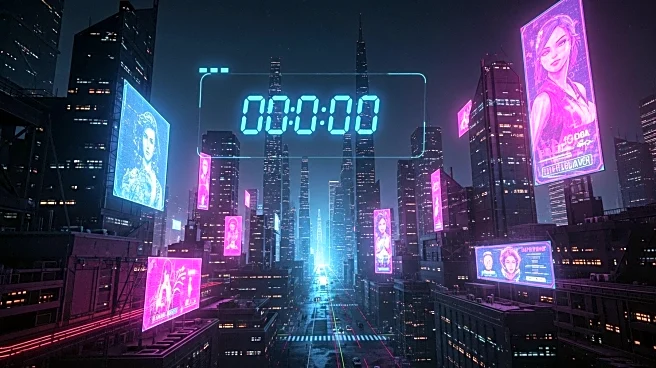What's Happening?
CD Projekt, the developer behind Cyberpunk 2077, has released a cryptic message on social media, prompting fans to speculate about upcoming developments. The message, dated September 4, 2025, calls for 'brave netrunners' to help defend the New United States of America (N.U.S.A.) from a cybersecurity threat. This in-universe message from President Rosalind Myers has led to debates about the franchise's canon, as Myers is not supposed to be president until 2065. Fans are uncertain whether this is an early sign-up for Cyberpunk 2, an alternate reality game (ARG), or simply a teaser for new content. The post has been shared by Cyberpunk 2's associate game director, Paweł Sasko, adding to the speculation.
Why It's Important?
The teaser has significant implications for the Cyberpunk franchise and its fan base. It suggests potential new content or developments, which could impact the game's narrative and player engagement. The timing of the message, close to Cyberpunk 2077's fifth anniversary, hints at possible celebrations or updates. This event could influence the gaming industry by setting a precedent for interactive storytelling and fan engagement through social media. The involvement of key figures like Paweł Sasko indicates that CD Projekt is actively working on expanding the Cyberpunk universe, which could lead to increased interest and investment in the franchise.
What's Next?
Fans are eagerly awaiting September 4 to see what CD Projekt has planned. Possible outcomes include announcements related to Cyberpunk 2, new content for Cyberpunk 2077, or details about the anime spin-off Edgerunners 2. The gaming community is likely to react with discussions and theories, influencing the direction of future content. CD Projekt's response to fan speculation and engagement will be crucial in maintaining interest and excitement around the franchise. The company may also use this opportunity to address past criticisms and improve its relationship with the gaming community.
Beyond the Headlines
This event highlights the evolving nature of storytelling in video games, where developers use social media and in-game narratives to engage players. It raises questions about the ethical implications of blending real-world and fictional elements, as well as the impact on fan expectations. The use of a fictional president to deliver a message could lead to discussions about political representation and narrative consistency in games. Long-term, this approach may influence how other developers create immersive experiences and interact with their audiences.









